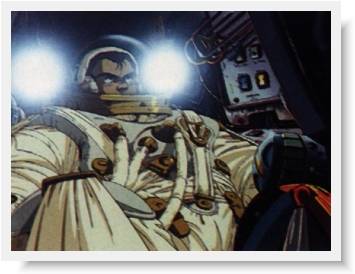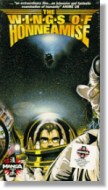![]()

Oneamisu no Tsubasa Oritsu Uchugun
(The Wings of Honneamise)
Copyright: © 1987 Gainax Co., © 1994-1995 Manga Entertainment Inc.
Length: 125 minutes
Genre: science-fiction
Rating: NR, Recommended for Mature Audiences
Format: Original Japanese Dialog / Subtitled (VHS), Dubbed (VHS)
Story by: Yamaga Hiroyuki Directed by: Yamaga Hiroyuki Character Design: Sadamoto Yoshiyuki Music: Sakamoto Ryuichi
![]()
Recommended for Mature Audiences - Strong dialog which is not suitable for younger audiences. Some nudity, including an attempted rape scene.
![]()

Somewhere, somewhen in space and time is a blue planet, floating amongst the stars. Nations, jealously protecting their political and economic borders have been waging wars for the past 100 years. A war which has taken its toll upon their citizens.
Lt. Shirotsugh Lhadatt had a dream as a child: to become a member of the Royal Air Force, and pilot a plane. But as he became of age, it became clear to him that his academic performance wasn't going to allow him to enter the Air Force. Instead, Lhadatt enlists in the Royal Space Force -- an organisation that is ridiculed by the military, and unknown by the public. This unappreciated, under-funded group of scientists and wild dreamers have a goal: to be the first to launch a man into outer space. But the politicians have decided to use their fledgeling space program as bait to draw an enemy attack upon the launch site, and now the Royal Space Force has a race on its hands...
![]()
|
Honneamise was Gainax's first movie -- and could have very well been their last. At a cost of 8 billion Yen, this production was the most expensive anime project at that time. The money spent of this movie really shows -- for this film's animation quality is something that is rarely seen, even after some 12 years since its initial release. Writer / director Yamaga Hiroyuki has created an wonderfully complex and diverse world, very much like our own, as his canvas for this "what if" fairy tale of a world's first attempts to launch a man into space. His world is one which has gone through the Earth equivalent of the Stone, Bronze and Iron ages, faced its version of the Industrial revolution, and is now facing the parallel of World War II. While aspects of the language and objects depicted this film may be non-human, you find yourself strangely familiar with everything -- almost as if you may have seen this world in a different lifetime. The brilliance of this approach is that there are no distractions by providing familiar, historical points of reference. Instead, the philosophical themes are allowed to shine through the script, their messages strangely resonating against the backdrops of a not-so alien world. Characterisations are very detached -- almost docu-drama in feel. But this 'arms-length' protrayal of both Shiro and Leiquinni (the religious devotee for whom Lhadatt falls) in no way diminishes their roles in the movie. Like many other elements in this film, each character has their own piece of history -- some things are hinted, others are explored in depth. (Speaking of characters -- the characters designs are refreshingly different from your typical anime fare. While they're not photorealistic, they do have facial features not normally seen in a Japanese production. Leiquinni, for example, has a real nose!) Music, composed by renowned artist Sakamoto Ryuichi, is one area that I found rather disappointing. While the soundtrack helps move the show along, it seemed uninspired -- somewhat repetetive, and included as almost an afterthought. The animation is where this production really shines. It's not particularily notable in frame rates, but it is richly detailed, and even more importantly, exceptionally well composed. Animation director Hideaki Anno utilizes dramatic angles and strong backgrounds to provide a richly illustrated world in turmoil. (Several scenes were obviously modelled after popular science-fiction movies). There are some instances where the frame composition seemed strangely out-of-place -- most notably during the final battle scene, with enemy ground forces advancing on the launch site. The direct close-ups of the infantrymen didn't portray the same level of dimension and depth as the rest of the movie. While this is a minor item, it does illustrate an interesting facet of filmmaking: if movies scenes are composed exceptionally well, the mere presence of any sub-standard scene will appear blatantly ordinary in comparison. And the animation itself? Breathtaking. The final scenes are simply a joy to watch. Aircraft behave like real aircraft. Explosions scatter shrapnel. And then there's the launch itself. Painstakingly rendered with assistance from NASA's film archives. The efforts of the animators are most rewarding to the viewers. Surprisingly, the English dubbed version is acceptable -- the actors sound bored, but otherwise, they're inoffensive. And give credit to the folks at Manga Entertainment. They didn't even try to re-work the Royal Space Force Anthem, which is a mixed blessing. It's not a great piece to begin with; but by not doing anything with it, they didn't make things worse. The major draw-back with the dub: the final dialog by Shiro is already a fairly trite and preachy speech. The strained English voice-over version is even more so. In the end, the real star of this production is the story itself. It's ambitious to a fault, plods uncomfortably slow at times, and ends on a weak editorialising note, but I found that this in no way diminishes this film's intent. Technology may grow, but if human nature does not grow with it, we are destined to be no better than the wielders of stone knives and bear-skin clothing. A most worthy message, in a most satisfying movie. |
![]()
| Original: | Subbed: | Dubbed: | |
|---|---|---|---|
| Story: | N/A | ||
| Direction: | N/A | ||
| Acting: | N/A | ||
| Animation: | N/A | ||
| Music: | N/A | ||
| Translation: | N/A | ||
| Overall Rating: | N/A |
![]()
- Oneamise No Tsubasa Oritsu Uchugun encyclopædia entry
- The Wings of Honneamise review by Roger Ebert, Chicago Sun-Times
- The Wings of Honneamise review at T.H.E.M. Anime
[ home ]
[ what's new ]
[ café contest ]
[ café reviews ]
[ parent's guide ]
[ encyclopædia ]
[ café trivia ]
[ café latté ]
[ café espresso ]
[ about the café ]
[ feedback ]
[ links ]
[ site map ]
© 1997-2000. All rights reserved. The Animé Café logo and the Crystal Kyoko award are original creations of the Animé Café. Please do not use any of the materials on this site without the expressed written permission of the Animé Café.
Page last modified 1999.10.24
